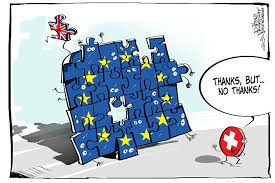Bruges Group Blog
Swiss know-how
The European Union is playing brinkmanship. It is making an offer of a 34-page composite "framework agreement", covering such matters as immigration, state aid, mutual recognition of industrial standards, agricultural products, air transport and land transport, where local rules would automatically adapt to be in line with EU law. The treaty would also aim to provide a more effective platform to resolve disputes using arbitration panels to handle disagreements while still giving the European Court of Justice a say in how to interpret it. This is, the EU says in its avuncular way, the best deal possible. And if it's not accepted? Well, access to the fabled single market could go, of course; and in addition, more immediate measures could be taken against the UK's vital financial industry. The government negotiating with the EU is split between those who believe a deal of some sort is necessary, and those (both left and right) who think it gives away too much sovereignty.
Sound familiar? Of course: welcome to Switzerland.
For years Switzerland has rubbed along with the EU on the basis of over 120 bilateral accords on all sorts of matters. The EU has for some time wanted to bring it more into line using this new proposed super-agreement. The Swiss, by all accounts, aren't playing. The result, besides proposed limitations on market access, is a threat by the EU to ban EU-based banks and brokers from trading on Swiss stock exchanges from 2019 as a punitive measure should Bern prove recalcitrant.
There are lessons here. First, the honesty of the Swiss in discussing the treaty being put forward is refreshing. The EU proposal in effect aims at giving the EU Commission powers to pass legislation that would take effect automatically within Switzerland on an ongoing basis. All shades of opinion in Switzerland have difficulty accepting this. The Swiss have a long tradition of autonomy, and the weasel idea that you can pool sovereignty without losing it, as if it were some kind of fondue in a common pot that we can all dip our bread into with equal enjoyment, doesn't cut much ice with them. Again, voters and trade unions are under no illusion about the free movement proposals. Swiss workers are famously well-paid, thanks to prosperity and a well-oiled system of industrial relations that makes strikes very rare.It's as obvious in Switzerland as it is in England that free movement of EU workers is incompatible with such harmonious and well-administered industrial relations.
Secondly, the Swiss regard it as natural to have a no-deal outcome. Notice, there's no insistence on a deal at all costs! if the EU does engage in punitive measures, then the result is simple. Switzerland will retaliate in kind with measures against Frankfurt (and, one fears, London until March 2019). Clear-headedness prevails in Switzerland – the land of the free.
Thirdly, if anyone still regards the EU as an enlightened internationalist body, tolerant of other nations' different ways of doing things and happy to co-operate, this should disabuse them. As far as the EU is concerned, it's the EU's way or no way, and other countries can like it or lump it.
Indeed, to outside observers, the EU comes across as a playground bully. The Commission is engagingly frank on this: "The European Commission respects the wish of the Federal Council to consult all stakeholders," adding "we therefore expect the consultation to be swift and hope that its outcome will be positive". In other words, this discussion is for the grown-ups; hurry up and get your own people into line. (And, in an aside to the UK and any other member States that might be thinking of having their own ideas, just watch out: we know where you live).
Put another way, it seems that as far as the EU is concerned, peaceful co-existence can increasingly go hang. The bloc is now sounding more like the US in the 1950s in Central and South America, or China this century in the China Sea: the regional strongman that everyone else is expected to gather round.
For all its diplomatic wording, the Swiss super-treaty is, as was intended, to be understood as an offer that cannot be refused. It remains to be seen how the Swiss will respond.At least there is a good chance that they will call the Commissioner's bluff.
Contact us
246 Linen Hall, 162-168 Regent Street
London W1B 5TB
Director : Robert Oulds MA, FRSA
Founder Chairman : Lord Harris of High Cross





